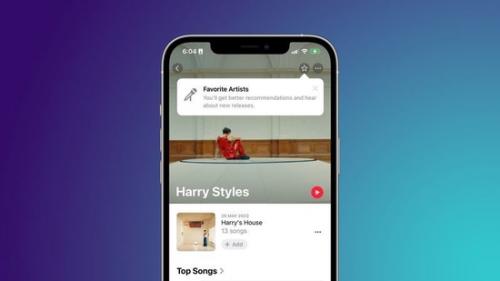your current location is:Home > Finance > NewsletterHomeNewsletter
Big move? Apple to sell ads on iPhones, sources say

according to reports, in order to explore new revenue sources, Apple is about to expand the area of advertising on the iPhone and iPad.
Before discussing how Apple can expand its advertising business, it's worth addressing an obvious question: how the company's privacy protections are suppressing third-party advertising on its platforms.
Last year, Apple introduced a feature called "App Tracking Transparency," also known as ATT, which lets users decide whether to let developers track them in other apps and websites -- precisely the main way marketers collect user data. way, the only way to deliver more relevant ads. Generally speaking, the more relevant your ad is, the more money you make.
Apple introduced this feature for good reasons, and the justice is irrefutable. Users should indeed have the right to choose whether to be tracked or not. It's undeniable, however, that AT&T did cause some collateral damage: companies big and small, and their revenues were hit hard.
No one feels this way more clearly than companies like Meta Platforms and Snap. The giants said they lost billions of dollars because of Apple's policy changes. However, smaller developers have also revealed that the feature has upended their business.
Reading this, it's easy to understand the irony: While attacking other people's advertising business, Apple itself is preparing to gradually expand its own advertising business.
First, look at the status quo: Apple's current advertising business includes display ads in News and Stocks apps, as well as in the App Store, iPhone, iPad and Mac. The App Store also has Google-like search ads, and Apple recently advertised its “Friday Night Baseball” deal with Major League Baseball on TV+.
In News and Stocks apps, display ads are similar to regular web ads that users see, while on the App Store these ads are presented as real apps and should be more useful to Apple users than loan ads.
Some may be unhappy with Apple's placement of ads in the News and Stocks app. After all, the iPhone appears to be a premium device. I've already spent over $1,000 on a phone, why does Apple continue to rack its brains to extract revenue from regular features?
Currently, a portion of the ad revenue under the "Today" tab in the News app is shared with content publishers, but the exact percentage is unknown. Apple also allows content publishers to advertise on its own stories and retains the vast majority of revenue. Surprisingly, if you subscribe to News+ for $10 a month, the "Today" ad will still appear, just in a slightly smaller number.
Of course, it's not surprising to see ads on news sites, even on paid news sites. But oddly, this also happens with paid services on iOS. This seems to be a departure from a promise made by the late Apple co-founder Steve Jobs in 2011 when he announced that iCloud would have no ads.
Another ironic detail is that the company's ad system uses data from other services and users' Apple accounts to decide which ads to serve. This is not in line with the Privacy First Policy by any means.
Users can turn off ad personalization (in the "Apple Advertising" item in the "Privacy and Security" category of the Settings app). The company says 78 percent of iOS 15 users do so. But the system still uses data such as carrier identity, device type and content read to serve ads.
Some may ask: Why doesn't Apple's app ask users for tracking permission through a pop-up window? According to ATT policy, other applications must comply with this requirement.
The reason, Apple said, is that the system "does not track users across apps and websites owned by other companies." And this kind of cross-application and cross-site tracking behavior is exactly the target of ATT's attack. If the third-party app doesn't track data on external apps or websites, it doesn't need to show the popup.
On the App Store, display ads appear in the "Recommended" section of the Search tab. Apple will soon also expand ads to the main "Today" tab, as well as third-party app download pages. App Store search ads are a little different: For example, developers can pay to have their apps appear in search results when users search for keywords such as "racing" or "basketball."
But the tech giant's future ambitions apparently don't stop there. A few months ago, Apple's advertising team gained a foothold in the company's Services division. Todd Teresi, vice president of advertising, begins reporting directly to Eddy Cue, head of services, from Peter Stern, vice president of services Stern). (Tracy reported to Cue on the days of Apple's iAd in-app ad network, but the service was shut down in 2016.)
The advertising business also received attention, but not positively, on Apple's most recent earnings call. CEO Tim Cook and CFO Luca Maestri said the business has faced some headwinds because of the coronavirus pandemic.
Cook, however, appears to have high hopes for the business, calling it an "excellent" discovery tool for app developers. You know, even for Apple's key projects, Cook did not use such positive words on the conference call, including AirPods, augmented reality, artificial intelligence, medical and fitness services and Apple Card.
In the advertising department, Tracy has also said that it will significantly expand the scale of the business. The business currently has an annual revenue of about $4 billion, and he hopes to increase it to the tens of billions level. This means that Apple needs to increase the horsepower.
It is very likely that Apple will eventually expand search ads into the Maps app, and digital content stores such as Apple Books and Apple Podcasts may also add such ads. And TV+ also has the potential to generate more ad revenue through a tiered subscription model — in fact, Netflix, Disney, and Warner Bros. Discovery Channel have all adopted this model with their respective streaming services.
Still, Apple shouldn't return to advertising in third-party apps -- at least not anytime soon, as the company tried and failed to do so with iAd in 2010.
Apple has internally explored adding search ads to Apple Maps. This feature may be similar to search ads in the App Store. For example, when a user searches for "sushi," a Japanese food store can pay to rank first in local search results. If you've used Yelp, you should know this pattern well.
In Books and Podcasts apps, content publishers can also pay for higher rankings and even run ads throughout the app. Publishers have long been able to sell books in the Apple Books app, and podcast subscriptions will also be tied to ads.
Meanwhile, ad-supported TV+ can offer older programming at low prices and help promote premium programming.
The only question now is: Are Apple users ready for more ads, beneficiaries of privacy policies and a clean interface?
related articles
Article Comments (0)
- This article has not received comments yet, hurry up and grab the first frame~












